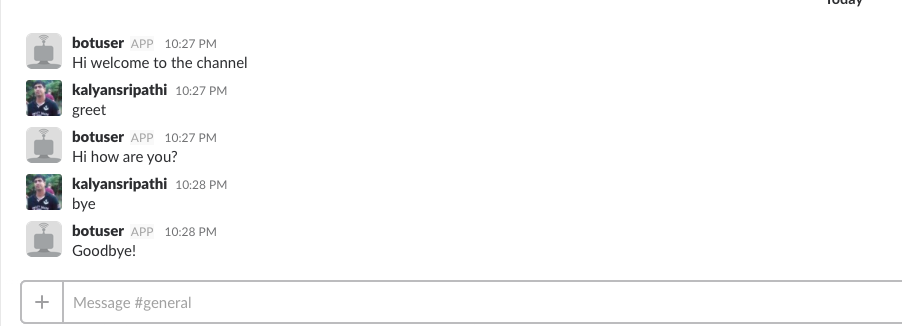SlackBot
A simple way to create slack bots for a conversational user experience. This is a wrapper around the slackbots package geared mainly towards channels
Installation
npm install slack-ux
Methods
-
setSuggestions(suggestions)(return: null) - sets the suggestions object that defines the keywords and the functions to invoke, -
isChannelConversation(message)(return: boolean) - returns a true/false of whether this message is a channel conversation, -
isMyChannel(message)(return: promise) - returns true/false of whether this message is from the configured channel, -
getChannelDetails(message)(return: promise) - returns a channel object with channel details, -
postChannelMessage(message)(return: null) - posts a message to the channel configured by in the settings, -
isFromBot(message)(return: boolean) - returns a true/false of whether the message event was just generated because of the bot posting to the channel, -
isChatMessage(message)(return: boolean) - returns a list of all channels in the team, -
callAction(message)(return: promise) - invokes the appropriate action function is the message matches any of the suggestions, -
getChannels()(return: promise) - returns a list of all channels in the team, -
getGroups()(return: promise) - returns a list of all groups in the team, -
getUsers()(return: promise) - returns a list of all users in the team, -
fns(return: null) - fns objects to hold all the invoked functions, -
getImChannels()(return: promise) - returns a list of bots direct message channels in the team, -
getChannel(name)(return: promise) - gets channel by name, -
getGroup(name)(return: promise) - gets group by name, -
getUser(name)(return: promise) - gets user by name, -
getUserByEmail(name)(return: promise) - gets user by name, -
getChannelId(name)(return: promise) - gets channel ID by name, -
getGroupId(name)(return: promise) - gets group ID by name, -
getUserId(name)(return: promise) - gets user ID by name, -
getChatId(name)(return: promise) - it returns or opens and returns a direct message channel ID, -
postEphemeral(id, user, text, params)(return: promise) - posts an ephemeral message to channel and user by ID, -
postMessage(id, text, params)(return: promise) - posts a message to channel | group | user by ID, -
updateMessage(channelId, timestamp, text, params)(return: promise) - updates a message in a channel, -
postTo(name, message [, params, callback])(return: promise) - posts a message to channel | group | user by name, -
postMessageToUser(name, message [, params, callback])(return: promise) - posts a direct message by user name, -
postMessageToGroup(name, message [, params, callback])(return: promise) - posts a message to private group by name, -
postMessageToChannel(name, message [, params, callback])(return: promise) - posts a message to channel by name. -
openIm(userId)(return: promise) - opens a direct message channel with another member in the team
Usage
const Bot = require('slack-ux');
var bot= new Bot({
token:'xoxb-111111111111-abcdefghijklmnopqrstuvwx', // Add a bot https://my.slack.com/services/new/bot and copy the token
name:'mybot',
channel:'mychannel'
});
bot.setSuggestions({
"greetMe":["hello","say hi","greet","welcome"],
"sayGoodBye":["leave","bye"]
});
bot.on('start', function(){
bot.postChannelMessage("Hi welcome to the channel");
});
bot.on('message',function(msg){
//Check what type of message it is
if(bot.isChatMessage(msg) && !bot.isFromBot(msg) && bot.isChannelConversation(msg)){
bot.isMyChannel(msg).then(res=>{ //Checks if this is a message form the channel mentioned in the settings
if(res)
bot.callAction(msg);
})
}
});
bot.fns.greetMe = function(){ //This name should the key in suggestions
bot.postChannelMessage("Hi how are you?");
}
bot.fns.sayGoodBye = function(){ //This name should match the key in the suggestions
bot.postChannelMessage("Goodbye!");
}Response Handler
The simplest way for handling response is callback function, which is specified as a last argument:
bot.postMessageToUser('user1', 'hi', function(data) {/* ... */});
bot.postMessageToUser('user1', 'hi', params, function(data) {/* ... */});But also you can use promises.
Error:
bot.postMessageToUser('user1', 'hi').fail(function(data) {
//data = { ok: false, error: 'user_not_found' }
})Success:
bot.postMessageToUser('user', 'hi').then(function(data) {
// ...
})Error and Success:
bot.postMessageToUser('user', 'hi').always(function(data) {
// ...
})